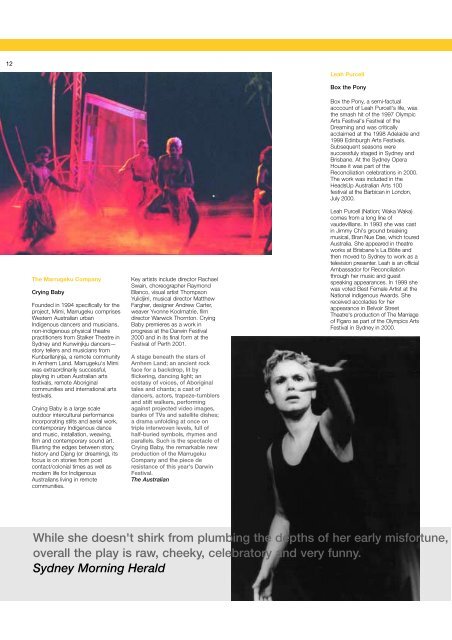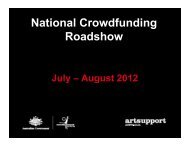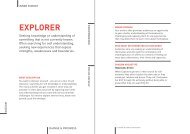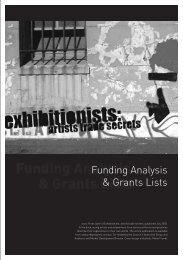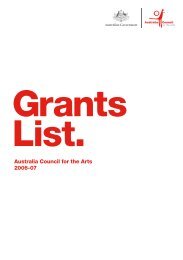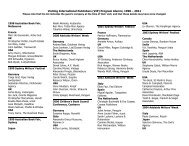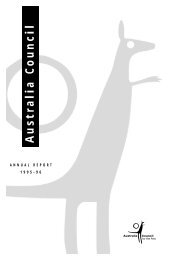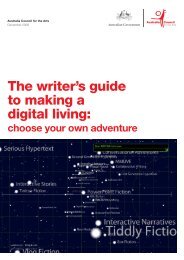Entire document - Australia Council for the Arts
Entire document - Australia Council for the Arts
Entire document - Australia Council for the Arts
Create successful ePaper yourself
Turn your PDF publications into a flip-book with our unique Google optimized e-Paper software.
12<br />
The Marrugeku Company<br />
Crying Baby<br />
Founded in 1994 specifically <strong>for</strong> <strong>the</strong><br />
project, Mimi, Marrugeku comprises<br />
Western <strong>Australia</strong>n urban<br />
Indigenous dancers and musicians,<br />
non-indigenous physical <strong>the</strong>atre<br />
practitioners from Stalker Theatre in<br />
Sydney and Kunwinjkju dancers—<br />
story tellers and musicians from<br />
Kunbarllanjnja, a remote community<br />
in Arnhem Land. Marrugeku's Mimi<br />
was extraordinarily successful,<br />
playing in urban <strong>Australia</strong>n arts<br />
festivals, remote Aboriginal<br />
communities and international arts<br />
festivals.<br />
Crying Baby is a large scale<br />
outdoor intercultural per<strong>for</strong>mance<br />
incorporating stilts and aerial work,<br />
contemporary Indigenous dance<br />
and music, installation, weaving,<br />
film and contemporary sound art.<br />
Blurring <strong>the</strong> edges between story,<br />
history and Djang (or dreaming), its<br />
focus is on stories from post<br />
contact/colonial times as well as<br />
modern life <strong>for</strong> Indigenous<br />
<strong>Australia</strong>ns living in remote<br />
communities.<br />
Key artists include director Rachael<br />
Swain, choreographer Raymond<br />
Blanco, visual artist Thompson<br />
Yulidjirri, musical director Mat<strong>the</strong>w<br />
Fargher, designer Andrew Carter,<br />
weaver Yvonne Koolmatrie, film<br />
director Warwick Thornton. Crying<br />
Baby premieres as a work in<br />
progress at <strong>the</strong> Darwin Festival<br />
2000 and in its final <strong>for</strong>m at <strong>the</strong><br />
Festival of Perth 2001.<br />
A stage beneath <strong>the</strong> stars of<br />
Arnhem Land; an ancient rock<br />
face <strong>for</strong> a backdrop, lit by<br />
flickering, dancing light; an<br />
ecstasy of voices, of Aboriginal<br />
tales and chants; a cast of<br />
dancers, actors, trapeze-tumblers<br />
and stilt walkers, per<strong>for</strong>ming<br />
against projected video images,<br />
banks of TVs and satellite dishes;<br />
a drama unfolding at once on<br />
triple interwoven levels, full of<br />
half-buried symbols, rhymes and<br />
parallels. Such is <strong>the</strong> spectacle of<br />
Crying Baby, <strong>the</strong> remarkable new<br />
production of <strong>the</strong> Marrugeku<br />
Company and <strong>the</strong> piece de<br />
resistance of this year's Darwin<br />
Festival.<br />
The <strong>Australia</strong>n<br />
Leah Purcell<br />
Box <strong>the</strong> Pony<br />
Box <strong>the</strong> Pony, a semi-factual<br />
acccount of Leah Purcell's life, was<br />
<strong>the</strong> smash hit of <strong>the</strong> 1997 Olympic<br />
<strong>Arts</strong> Festival's Festival of <strong>the</strong><br />
Dreaming and was critically<br />
acclaimed at <strong>the</strong> 1998 Adelaide and<br />
1999 Edinburgh <strong>Arts</strong> Festivals.<br />
Subsequent seasons were<br />
successfuly staged in Sydney and<br />
Brisbane. At <strong>the</strong> Sydney Opera<br />
House it was part of <strong>the</strong><br />
Reconciliation celebrations in 2000.<br />
The work was included in <strong>the</strong><br />
HeadsUp <strong>Australia</strong>n <strong>Arts</strong> 100<br />
festival at <strong>the</strong> Barbican in London,<br />
July 2000.<br />
Leah Purcell (Nation; Waka Waka)<br />
comes from a long line of<br />
vaudevillians. In 1993 she was cast<br />
in Jimmy Chi's ground breaking<br />
musical, Bran Nue Dae, which toured<br />
<strong>Australia</strong>. She appeared in <strong>the</strong>atre<br />
works at Brisbane's La Bôite and<br />
<strong>the</strong>n moved to Sydney to work as a<br />
television presenter. Leah is an official<br />
Ambassador <strong>for</strong> Reconciliation<br />
through her music and guest<br />
speaking appearances. In 1999 she<br />
was voted Best Female Artist at <strong>the</strong><br />
National indigenous Awards. She<br />
received accolades <strong>for</strong> her<br />
appearance in Belvoir Street<br />
Theatre's production of The Marriage<br />
of Figaro as part of <strong>the</strong> Olympics <strong>Arts</strong><br />
Festival in Sydney in 2000.<br />
While she doesn't shirk from plumbing <strong>the</strong> depths of her early mis<strong>for</strong>tune,<br />
overall <strong>the</strong> play is raw, cheeky, celebratory and very funny.<br />
Sydney Morning Herald


